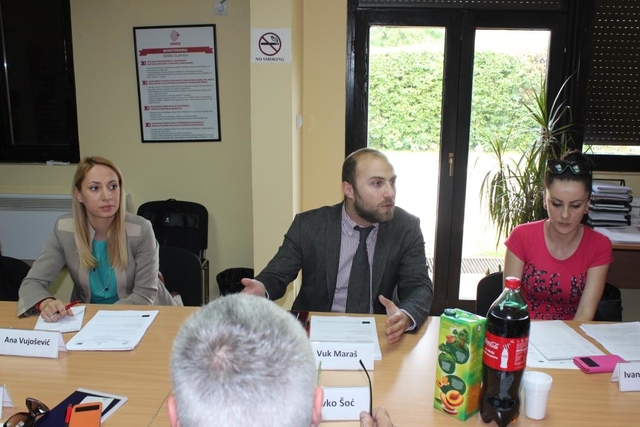Centre for Civic Education (CCE), Association of Youth with Disabilities of Montenegro (AYDM) and Network for the affirmation of non-governmental sector (MANS) today formed a Working group which will be in charge of the analysis of bylaws of State Election Commission and the creation of proposal for their improvement, as one of the prerequisites for free and fair elections in Montenegro.
Working group is composed of the representatives of the majority of parliamentary political subjects in Montenegro and non-governmental organisations that deal with the elections from various angles. The constituent meeting was attended by Srđan Miljanić (Democratic Party of Socialists), Spasoje Kovačević and Slađana Živković (Socialist People’s Party), Miodrag Radović (Social-democratic party), Aleksandar Jovićević (Social-democrat of Montenegro), Zagorka Pavićević and Jelena Milićević (Positive Montenegro), Haris Mekić (Bosniak Party), Luka Rakčević (United Reform Action), Zdravko Šoć (Liberal Party), Hasim Resulbegu (FORCA), Marash Dedvukaj (Albanian Alternative) and Milica Kovačević (Centre for Democratic Transition), while Ana Vujošević from CCE, Ivana Bogdanović from AYDM and Vuk Maraš from MANS attended on the behalf of the organisers. In the work of the Working group also participate Savo Šofranac (DEMOS), Vladimir Jokić (Democrats of Montenegro) and Dubravka Popović (Center for monitoring and research), who was not able to attend the constituent meeting due to objective reasons.
Objective of Working group is to consider every existing bylaw of State Election Commission which prescribe in detail different aspects of election activities, as well as to offer some solutions for their improvement, all in order to meet the upcoming parliamentary elections, planned for October 2016.
As the organisers of Working group stated on several occasions, the existing bylaws are characterised with numerous flaws, such as the example of situation regarding the possibility of vote by the person whose photograph is not in the system of Ministry of Interior during the conclusion of voter register, or insufficiently precise use of the right of secret vote of persons with disabilities, as well as the obligations related to accessibility of voting posts. On the other hand, some bylaws do not prescribe precise legal actions, primarily the procedure for decision-making on complaints by election commissions and the presentation of evidence in these proceedings, as well as the cases of determining the conflict of interest between the members of bodies in charge of the implementation of elections.
Framework of Working group includes the following bylaws: Rules on the work of polling committees, Rules on the voting by letter, Rules on the determination and regulation of polling stations and on the measures which ensure the secrecy of vote, Code of ethics of bodies in charge of the implementation of elections and the Rulebook of State Election Commission, and should the members of Working group issue such a request, reach of their mandate could expand on every other bylaw which falls under the competence of State Election Commission.
Plan is that Working group analyses the bylaws and defines the recommendations for its improvement by 7 July 2016, after which the recommendations will go through the consultations with the stakeholders and submitted to State Election Commission for further action.
Constitution and work of the Working group is part of project “Fair elections free of corruption” financed by the European Union.
CCE, AYDM and MANS

